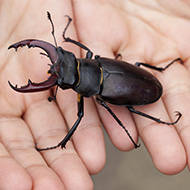Event to celebrate threatened stag beetle

Male stag beetles have large antler-like jaws.
A weekend-long event to celebrate one of the UK’s largest beetles has been announced by the People’s Trust for Endangered Species (PTES).
The aptly-named Stag Weekend – a Celebration of Stag Beetles (5-7 June) will see members of the public making their gardens stag-beetle friendly and participating in the annual Great Stag Hunt.
Stag beetles were once a common sight in Britain, but years of habitat loss have seen their numbers decline. The desire for tidy parks and gardens has seen the removal of decaying tree stumps which are a vital food source for stag beetles.
With stag beetle season now upon us, PTES is calling on the public to look out for stag beetles on warm sunny evenings. The campaign is being supported by a beetle identification guide together with an online survey for people to report their findings.
PTES writes: 'You may see stag beetles flying around on warm summer evenings, or you might dig up the large, white grubs, called larvae, in the garden. The stag beetle is our largest land beetle and the males have characteristic ‘antlers’- but don’t worry, they are harmless. In fact, they desperately need our help.
'These amazing creatures used to be a common sight, especially in the south of the UK, but sadly they are declining. They’ve even become extinct in a couple of European countries. We can’t let that happen here, so please join us in a national effort to save them this summer with our #StagWeekend from the 5th -7th June 2020!'
Stag beetles spend much of their life underground, only emerging in the summer to find a mate. They reside in the woodland edges, hedgerows, traditional orchards, parks and gardens throughout Western Europe including Britain, but not Ireland.
Stag beetles are relatively widespread throughout the south of England and live in the Severn valley and coastal areas of the southwest. Elsewhere in Britain, they are extremely rare or even extinct.



 BSAVA is to partner with BVA Live (11-12 June 2026) to champion clinical research.
BSAVA is to partner with BVA Live (11-12 June 2026) to champion clinical research.